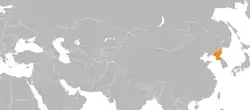North Korea–Palestine relations
North Korea–Palestine relations (Korean: 팔레스티나-조선민주주의인민공화국 관계;Arabic: العلاقات الفلسطينية الكورية الشمالية) refers to the bilateral relations between North Korea and Palestine. North Korea has long regarded Israel as an "imperialist satellite"[1] and recognizes the sovereignty of Palestine over all territory held by Israel, excluding the Golan Heights, conquered from Syria in 1967 and annexed in 1981, which is considered as Syrian territory by the international community, North Korea included.
 | |
Palestine |
North Korea |
|---|---|
History
North Korea's relations with the Palestine Liberation Organization began in 1966.[2] Kim Il-sung and Yasser Arafat had a very close relationship and North Korea provided aid to the Palestinians. North Korean support for the PLO began in the 1970s and included the supply of small amounts of arms and military aid. North Korean arms in the Middle East included aid to several leftist factions and revolutionary movements such as the PLO and the Popular Front for the Liberation of Palestine and the Democratic Front for the Liberation of Palestine. North Korean arms and aid to Palestinian factions continued until the opening up of China under Deng Xiaoping and political reforms in the Soviet Union under Mikhail Gorbachev during the 1980s.
After the fall of the Soviet Union, North Korean involvement in the Palestinian-Israeli conflict declined and North Korea shifted from the exporting of revolution to pragmatism.[3] Since then North Korea has continued to support the Palestinian cause and has strongly condemned every Israeli action in the region. During the Gaza War (2008–09), North Korea harshly condemned Israeli actions. A Foreign Ministry spokesman denounced the killing of unarmed civilians and called it a crime against humanity as well as a threat to the Middle East Peace Process.[4] On the floor of the UN General Assembly the North Korean permanent representative Sin Son-ho said that North Korea "fully supported Palestinians’ struggle to expel Israeli aggressors from their territory and restore their right to self-determination."[5]
After the 2010 Gaza flotilla raid the North Korean Foreign Ministry called the attack a "crime against humanity" which was perpetrated under the guidance of the United States. The North Korean statement also expressed full support for the self-determination of the Palestinian Arabs.[6]
During the 2014 Israel–Gaza conflict, on 15 July, the Foreign Ministry issued a statement that read: "We bitterly denounce Israel's brutal killings of many defenseless Palestinians through indiscriminate military attacks on peaceable residential areas in Palestine as they are unpardonable crimes against humanity."[7]
See also
- North Korea–Israel relations
- Foreign relations of North Korea
- Foreign relations of Palestine
References
- Haggard, M (1965). "North Korea's International Position". Asian Survey. California, United States: University of California Press. 5 (8): 375–388. doi:10.2307/2642410. ISSN 0004-4687. JSTOR 2642410. OCLC 48536955.
- Wertz, Daniel; Oh, JJ; Kim, Insung (2015). The DPRK Diplomatic Relations (PDF) (Report). National Committee on North Korea. p. 3.
- "North Korea-Relations with the Third World". Archived from the original on 2009-09-17. Retrieved 2010-12-10.
- "DPRK denounces Israel for bombarding Gaza". Xinhua News Agency. 2008-12-30. Archived from the original on 2014-02-19.
- UNGA10807
- News From Korean Central News Agency Of Dprk Archived 2009-09-11 at WebCite. Kcna.co.jp. Retrieved on 2010-06-19.
- 조선중앙통신

